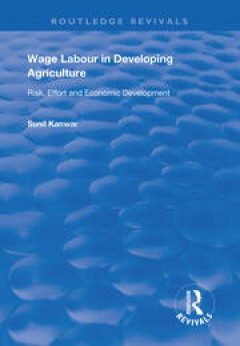Filter by

Wage Labour in Developing Agriculture : Risk, Effort and Economic Development
Published in 1998, this books is an examination of farm decision-making, incorporating the elements of risk in both production and off-farm or casual wage labour. Farm household decision-making is studied, and issues of wage determination, pricing, commodity price stabilization and producer income and output are also explored.
- Edition
- -
- ISBN/ISSN
- 9780429432460
- Collation
- -
- Series Title
- -
- Call Number
- 630

Sustainable Food Futures: Multidisciplinary Solutions
Securing sustainable food for everyone is one of the world's most pressing challenges, but research, policy, and programmes remain fragmented, and effective solutions have been slow to emerge. This book takes on these challenges by proposing a range of solutions that can advance pathways towards sustainable food futures. Complete with recipes, this book is structured so that readers are taken …
- Edition
- -
- ISBN/ISSN
- -
- Collation
- -
- Series Title
- -
- Call Number
- -

Saving the Tropical Forests
The destruction of the tropical forest is one of the major problems of our time. Vast areas are rapidly becoming wastelands which support only a few tough weeds, perhaps some cattle, and the farms allowed to the poor. This book provides a vision of hope: in Latin America. Africa. And South East Asia, growing numbers of people are developing techniques specifically designed to promote the wise …
- Edition
- -
- ISBN/ISSN
- 9781315066899
- Collation
- -
- Series Title
- -
- Call Number
- -

Regenerative Farming and Sustainable Diets : Human, Animal and Planetary Health
This book makes the case for an urgent move away from industrial agriculture towards regenerative farming and the promotion of plant-based diets. How we produce, distribute and consume food are critical issues for the health and well-being of humans, animals and the environment. In order to develop a sustainable food system, this book argues for a radical change in farming and food consumption…
- Edition
- -
- ISBN/ISSN
- 9781032684369
- Collation
- -
- Series Title
- -
- Call Number
- -

Technological Innovations in Tropical Livestock Development for Environmental…
This book contains the proceedings of the fourth International Conference on Tropical Animal Production for Food Security (ITAPS) exploring Technological Innovations in Tropical Livestock Development for Environmental Sustainability and Food Security. It discusses two interconnected issues: tropical livestock farming and environmental concerns, while addressing the adoption of innovative techn…
- Edition
- -
- ISBN/ISSN
- 9781003468943
- Collation
- -
- Series Title
- -
- Call Number
- -

Area-Wide Management of Fruit Fly Pests
ABSTRACT Fruit fly (Diptera: Tephritidae) pests have a profound impact on horticultural production and economy of many countries. It is fundamental to understand their biology and evaluate methods for their suppression, containment, or eradication. Area-Wide Management of Fruit Fly Pests comprises contributions from scientists from around the world on several species of tephritids working on d…
- Edition
- -
- ISBN/ISSN
- 9780429355738
- Collation
- 440 p
- Series Title
- -
- Call Number
- -

Cellular dialogues in the holobiont
ABSTRACT This book examines how the growing knowledge of the huge range of protist-, animal-, and plant-bacterial interactions, whether in shared ecosystems or intimate symbioses, is fundamentally altering our understanding of biology. The establishment and maintenance of these interactions and their contributions to the health and survival of all partners relies on continuous cell-to-cell com…
- Edition
- -
- ISBN/ISSN
- 9780429277375
- Collation
- 314 p
- Series Title
- -
- Call Number
- -

Diseases of edible oilseed crops
ABSTRACT This book presents an unprecedentedly thorough collection of information on the diseases of cultivated annual oilseed crops, including peanut, rapeseed-mustard, sesame, soybean, sunflower, and safflower. It covers and integrates global literature on the subject up to 2014, setting it apart from other books that are only of regional importance. The authors are internationally recognize…
- Edition
- -
- ISBN/ISSN
- 9780429169670
- Collation
- 484 p
- Series Title
- -
- Call Number
- 630 CHA d

Science, Information, and Policy Interface for Effective Coastal and Ocean Ma…
This book provides a timely analysis of the role that information-particularly scientific information-plays in the policy-making and decision-making processes in coastal and ocean management. It includes contributions from global experts in marine environmental science, marine policy, fisheries, public policy and administration, resource management
- Edition
- -
- ISBN/ISSN
- 9780429153938
- Collation
- 512 p
- Series Title
- -
- Call Number
- 333 SCI

The cost manual of laboratory animal care and use: refinement, reduction, and…
COST (European Cooperation in the field of Scientific and Technical Research) is an intergovernmental initiative in science and research intended to promote the coordination of nationally funded research in Europe. Four working groups discuss the housing of animals, their environmental needs, refinement of procedures, genetically modified animals, and cost-benefit analysis. Based on the activit…
- Edition
- -
- ISBN/ISSN
- 9780429146060
- Collation
- 439 p
- Series Title
- -
- Call Number
- 570 COS
 Computer Science, Information & General Works
Computer Science, Information & General Works  Philosophy & Psychology
Philosophy & Psychology  Religion
Religion  Social Sciences
Social Sciences  Language
Language  Pure Science
Pure Science  Applied Sciences
Applied Sciences  Art & Recreation
Art & Recreation  Literature
Literature  History & Geography
History & Geography